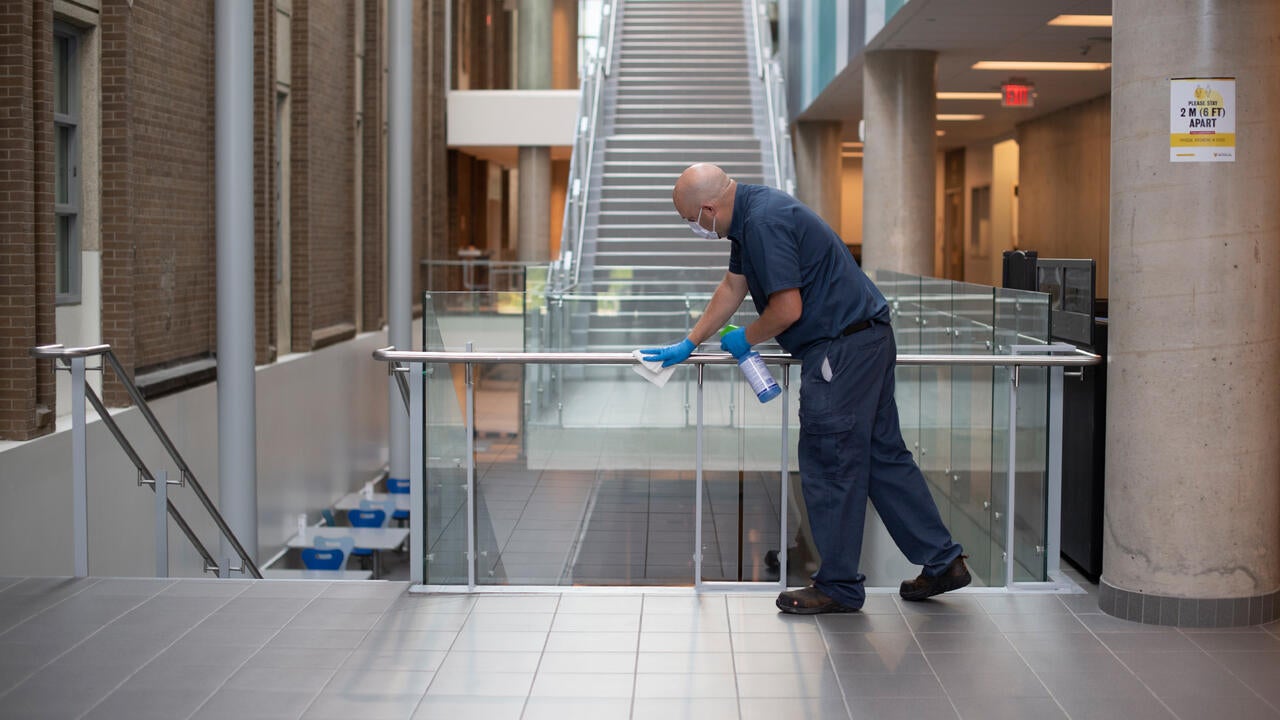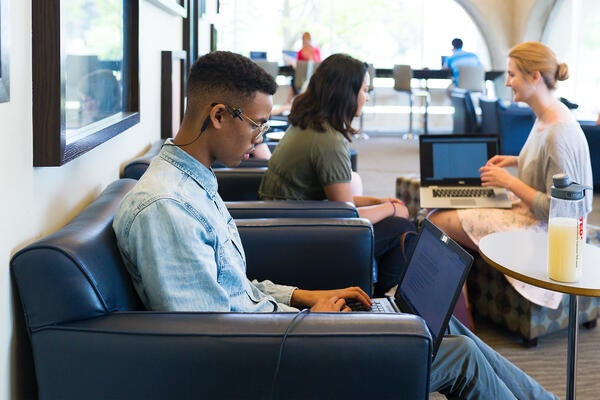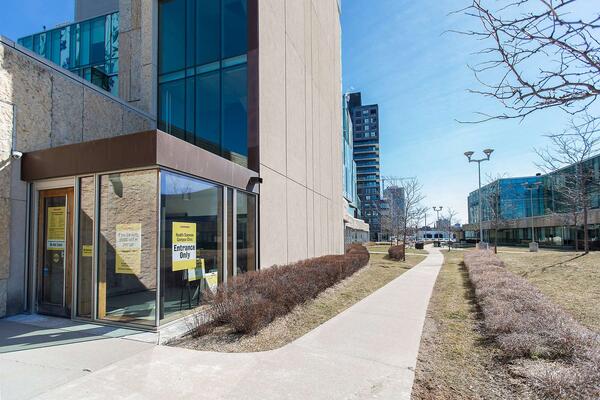
10 ways Waterloo is providing a safe return to campus
Enhanced back-to-school measures to protect campus community

Enhanced back-to-school measures to protect campus community
By Victoria Lumax University RelationsAs a staged return to campus approaches, the University of Waterloo has implemented measures to keep faculty, staff, students and visitors safe.
Under the guidance of provincial and local public health guidelines, Waterloo continues to follow instructions provided by the Ontario Ministry of Colleges and Universities. In these efforts, Waterloo’s Safety Office has worked closely with campus partners to develop strategies for a safe re-opening.
“Throughout the pandemic, we have put the health and safety of our employees and students first and continue to strive to meet regulatory requirements and strongly promote adherence to public health advice,” Kate Windsor says, Waterloo’s director of safety. “Relying on our internal responsibility system for health and safety, where everyone plays a part in keeping each other safe, continues to be a great strength of our campus community. We will need to continue to be diligent and adaptable to changing conditions as we gradually resume more on-campus activities.”
Waterloo’s top ten safety measures include:
Anyone coming to our campuses and locations must provide proof of vaccination against COVID-19 prior to their arrival. Please note that accommodations are available for medical or human rights grounds. This is aligned with the Council of Medical Officers of Health recommendations for all post-secondary institutions.
Additionally, our campus will also continue Waterloo’s “Campus Check-in” process for Waterloo’s reporting and monitoring tool purposes.
Waterloo is proud to be supporting vaccine roll-out efforts, offering vaccines at Health Services. Health Services also offers COVID-19 testing options. For information on availability and eligibility, visit the respective COVID-19 Vaccine Centre and COVID-19 Testing Assessment Centre webpages. At-home, rapid antigen testing kits are available for pick up at all campuses (including satellite campuses) and during off-hours. Testing kits are available to employees, faculty and students.
Those in the campus community may submit a COVID-19 Assessment Registration Form for support from Health Services if they test positive for COVID-19, experience symptoms or think they may need to quarantine or get tested.
Vaccines are required for those living in Waterloo’s on-campus residences, as recommended by Region of Waterloo Public Health and Emergency Services. Waterloo has developed a framework for vaccination requirements where you can learn more information.
COVID-19 can spread through extended airborne exposure and for the past year, Waterloo’s Plant Operations team has been inspecting, improving and conducting ongoing assessment of heating, ventilation and air conditioning (HVAC) units on campus to accommodate building occupancy and new guidelines for health and safety. Learn more about Waterloo’s upgraded ventilation and filtration systems across campus.
Plant Operations has increased the cleaning frequency of many space types across campus, ensuring that working and learning environments are sanitary and safe. As well, University departments can purchase COVID-19 products and supplies through Plant Operations.
To help mitigate the spread of COVID-19 and increase flexibility for students, the University is offering three different kinds of learning formats: in-person, online and blended. Online and in-person academic support will be available through the Student Success Office, the Writing and Communication Centre and the Libraries.
It is Waterloo’s requirement that in all common-use, indoor spaces — workplaces, classrooms, University buildings and student residences — non-medical masks must be worn, as supported by public health guidelines. This pertains to employees, students, visitors and contractors. Mask wearing in employee-only areas will be based on physical set up, number of employees present and work duties. These measures aim to reduce risk of COVID-19 transmission.
If a medical condition or disability requires an exemption, students and employees can submit a Face Covering Exemption Request Form to Accessibility Services or Occupational Health respectively to develop an accommodation plan.
Since June 21, 2021, Waterloo has been operating a COVID-19 rapid screening site in the Student Life Centre (SLC) on campus. This voluntary testing is a great resource for asymptomatic individuals who come to campus regularly and have regular contact with other employees and can help break the chain of transmission on our campus by preventing individuals from unknowingly spreading COVID-19.
Campus Check-in will help funnel those in the Waterloo community who do not report being vaccinated to this service.
Waterloo is taking a multi-faceted approach to safety by offering rapid screening along with testing and vaccination.
Waterloo in piloting a wastewater surveillance program in some of its residences based on sampling feasibility. Researchers within our Department of Biology will test wastewater three times a week as an extra measure of monitoring COVID-19 on campus.
Waterloo is providing department and research groups with an overarching safety plan template which offers a guideline for departments and lab to conduct their operations in line with the latest safety protocols from Public Health.
As part of this plan, the University has implemented COVID-19 signage around campus to communicate important information such as instruction on hand hygiene, COVID-19 symptoms, cough and sneeze etiquette.
The University has a strong relationship with local public health authorities, working closely with them to conduct contact tracing as required upon discovery of an active case. As well, managers and supervisors will be expected to and be responsible for knowing who is in the office and when, so that COVID-19 transmission can be tracked.
The private data collected through Campus Check-In will aid the University in contact tracing.
Dr. Vivek Goel, president and vice-chancellor, is grateful to the Waterloo community for their hard work in promoting collective well-being and upholding a culture of excellence.
“As we prepare to return to campus, the University is working hard to ensure the safety of our faculty, staff and students remains our top priority,” says Goel. “Thank you to our departments and divisions across our campuses who have been working together and following public health guidelines to make this return a reality. We couldn't have done it without your support."
Ongoing COVID-19 updates can be found on Waterloo’s COVID-19 Information website.

Read more
Student supports and resources for a successful fall term.

Read more
New system increases the correctness and reliability of health-related searches by 80 per cent

Read more
For much of 2021, Waterloo collaborated with local partners to run a busy regional vaccine clinic
The University of Waterloo acknowledges that much of our work takes place on the traditional territory of the Neutral, Anishinaabeg, and Haudenosaunee peoples. Our main campus is situated on the Haldimand Tract, the land granted to the Six Nations that includes six miles on each side of the Grand River. Our active work toward reconciliation takes place across our campuses through research, learning, teaching, and community building, and is co-ordinated within the Office of Indigenous Relations.